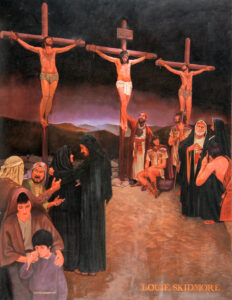Daily Lesson for Tuesday 17th of September 2024
Read Mark 15:21-38. What terrible and painful irony appears in these passages?
At this point in the Passion Narrative, Jesus is a silent victim, controlled by people who are bent on His death. Throughout the Gospel, up to His arrest, He was the master of activities. Now He is acted upon. Though He was a robust itinerant preacher, the beating He had received and the lack of food and sleep wore Him down to where a stranger had to bear His cross.
At the cross His garments were removed and became the property of the soldiers, who cast lots to see whose they would be (compare with Psalms 22:18). Crucifixion was a fairly bloodless method of execution. The nails used to fasten a person to the cross (compare with John 20:24-29) were likely driven through the wrist below the palm where no major blood vessels run. (In both Hebrew and Greek, the word for “hand” can refer to both the hand and the forearm.)
The palm of the hand itself does not have the structures necessary to carry the weight of the body in crucifixion. The median nerve runs through the center of the forearm and would be crushed by the nails, causing excruciating pain up the arm. Breathing was difficult. To get a good breath, victims of crucifixion had to push against their nailed feet and flex their arms, again causing agonizing pain. Exhaustion asphyxia was one of the possible causes of death.
Jesus received tremendous mockery and humiliation during His crucifixion. The Gospel of Mark has a revelation/secrecy motif in which Jesus typically calls for silence about who He is. Consequently, such Christological titles as “Lord,” “Son of God,” or “Christ” do not appear often in the narrative.
This element changes at the cross. He cannot be hidden. It is ironic that it is the religious leaders who use these titles in mocking Jesus. How these men are condemning themselves!
One of their mocking statements stands out. In Mark 15:31, they say, “ ‘He saved others; he cannot save himself’ ” (ESV). To make their point about His helplessness on the cross, they indicate that He did help others (the Greek verb can mean “save,” “heal,” or “rescue”). Thus, ironically, they admit He is the Savior. The irony goes further—the reason He could not, or would not, save Himself was because at the cross He was saving others.
|
Read John 1:1-3, and then think about what this passage tells us about Jesus, the same Jesus who is being crucified here in Mark. How do we wrap our minds around what Christ’s death means for us? |
 (0)
(0)



